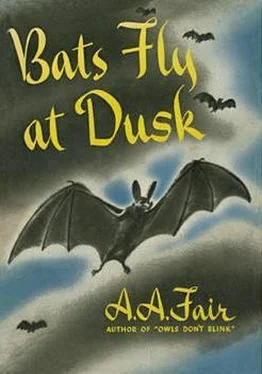“Skip it,” Bertha said. “I can appreciate why your cousin felt the way he did. Go on from there.”
“You mean about the spades?”
“No, about your cousin. Where did he live? Hotel, boarding house, club, or—”
“No, Mrs. Cool. He didn’t live in any of those places. Unfortunately, he sought to maintain his own domicile.”
“Who ran it for him?”
“A housekeeper.”
Bertha’s glittering eyes commanded additional information from her visitor.
“A Mrs. Nettie Cranning. A woman who, I should say, is somewhere in the forties. She has a daughter, Eva, and a son-in-law, Paul Hanberry.”
“Paul and Eva live in the house with them?” Bertha asked.
“That’s right, Mrs. Cool. Paul was the chauffeur who drove my cousin around on the somewhat rare intervals when he went places in an automobile. Mrs. Cranning, Paul, and Eva Hanberry live there in the house. Eva, I believe, acted technically as an assistant to her mother. They all drew rather large salaries, and it was, if you ask me, a highly inefficient and expensive arrangement.”
“How old is Eva?”
“I should say around twenty-five.”
“And her husband?”
“About ten years older.”
“What do they say about the money that was supposed to have been in the wallet?”
“That’s just the point,” Milbers said. “I haven’t mentioned it to them.”
“Why not?”
“I am very much concerned that whatever I do say won’t seem to be an accusation; yet I feel it is something that should be discussed.”
“Do you, by any chance, want me to do the discussing?” Bertha asked with a sudden flash of inspiration.
“That’s right, Mrs. Cool.”
Bertha said, “I’m good at that.”
“It’s a field in which my weakness is deplorable,” Milbers admitted.
Bertha, regarding him speculatively, said, “Yes, I can imagine — if the housekeeper is of a certain type.”
“Exactly,” Milbers agreed, separating his fingertips and bringing them together again at regular intervals. “She’s precisely that type.”
“Now, there was a letter about one five thousand dollars in cash. How about the other five grand?”
“That was because my cousin wished to attend an auction of some rare books. His sickness prevented him from doing so. His bank, however, confirms the five thousand withdrawal. As I compute it, Mrs. Cool, my cousin had — must have had — ten thousand dollars in his wallet at the time of his death.”
Bertha puckered her lips, whistled a few bars, and asked suddenly, “How about you, are you well fixed?”
“What does that have to do with it?”
“It gives me the whole picture.”
Christopher Milbers, after deliberating for a moment, said cautiously, “I have a farm in Vermont. I make maple sugar and syrup, and sell by mail. I make a living, but I can’t say I do any more than that.”
“Your cousin a customer?”
“Yes, he bought his syrups from me. He liked maple sugar, but had that sent to his office rather than the house. From time to time I would send him samples of new confections I was putting out — sent him one, in fact, only last week. It’s so hard to think of him as not being still alive—”
“Large samples?”
“No. Definitely not. In selling sweets, one never sends enough to cloy the taste, only just enough to whet the sweet tooth.”
“Charge your cousin, or send him the stuff free?”
“I charged him regular list less thirty per cent. — and he always was careful to take off an additional two per cent for cash.”
Bertha held up her right hand, the first and second fingers spread wide apart in a V. “In other words,” she said, “you and your cousin were close to each other — just like this.”
Milbers smiled. “You should have known my cousin. I doubt if anything ever got close to him — not even his undershirt.”
“No? How about the housekeeper?”
A shadow crossed the man’s face. “That is one of the things that worries me. She undoubtedly wanted him to become dependent upon her. I am a little afraid of her.”
“I’m not,” Bertha said. “Let’s go.”
Nettie Cranning, red-eyed with grief, gave Bertha Cool her hand and said, “Do come in, Mrs. Cool. You’ll pardon me, but this has been a terrible shock to me — to all of us. My daughter, Eva Hanberry, and this is my son-in-law, Paul Hanberry.”
Bertha invaded the reception hallway with brisk competence, shook hands with everyone, and forthwith proceeded to dominate the situation.
Nettie Cranning, a woman in the early forties who devoted a great deal of attention to her personal appearance and had cultivated a mannerism which was just short of a simper, quite evidently tried to be a perfect lady at all times.
Her daughter Eva was a remarkably good-looking brunette with long, regular features, thin, delicate nostrils, arched eyebrows, a somewhat petulant mouth, and large, long-lashed, black eyes which seemed quite capable of becoming packed with emotion if occasion presented.
Paul Hanberry seemed very much a masculine nonentity, drained dry by the relatively stronger personalities of the two women. He was of average height, average weight; a man who created no particular impression. As Bertha Cool expressed it afterwards in her letter to Donald Lam, “You could look at the guy twice without seeing him.”
Christopher Milbers promptly effaced himself into the background, hiding behind Bertha Cool’s dominant personality as though he had been a child tagging along when his mother went to school to “investigate” the administration of a discipline of which she did not approve.
Bertha lost no time getting to the point.
“All right, folks,” she said. “This isn’t a social visit. My client, Christopher Milbers, is getting things cleaned up here.”
“Your client?” Mrs. Cranning asked with cold, arch reserve. “May I ask if you’re a lawyer?”
“I’m not a lawyer,” Bertha said promptly. “I’m a detective.”
“A detective!”
“That’s right.”
“Well, good heavens!” Eva Hanberry exclaimed.
Her husband pushed his way forward. “What’s the idea of having a detective in on the job?” he asked with a ludicrous attempt at bluster which made it seem as though he might be trying to bolster his own courage.
Bertha said, “Because there’s ten thousand dollars missing.”
“What?”
“You heard me.”
“Are you,” Mrs. Cranning asked, “accusing us of taking ten thousand dollars?”
“I’m not accusing anybody,” Bertha said, then waited a moment and added significantly, “yet.”
“Would you kindly explain exactly what you mean?” Eva Hanberry demanded.
Bertha said, “When Harlow Milbers died, he had ten thousand dollars in his wallet.”
“Who says so?” Paul Hanberry asked.
“I do,” Christopher Milbers announced, coming forward a step so that he was standing at Bertha Cool’s side, “and I happen to be in a position to prove my statement. My cousin was intending to negotiate for the purchase of some very rare contemporary historical books: Because of certain considerations which needn’t enter into the discussion, the purchase was to be for currency. He had ten thousand dollars in currency in his possession the day he died.”
“Well, he hid it somewhere, then,” Mrs. Cranning said, “because it wasn’t in his wallet when he died.”
“No, he didn’t,” Christopher Milbers said. “He always kept five—”
Bertha Cool brushed him backwards and into silence with a sweeping gesture of her arm. “How do you know it wasn’t in his wallet when he died?” she demanded of Mrs. Cranning.
Читать дальше









